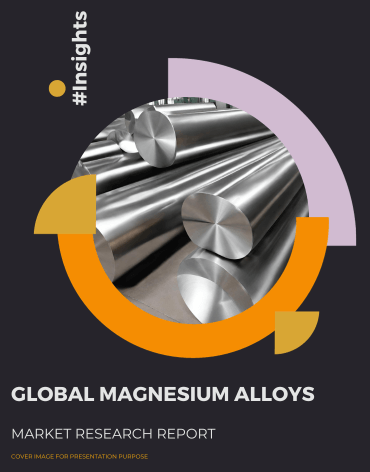Investing in Magnesium Alloys: Prospects of a $2.2 Billion Market by 2029

The magnesium alloy industry refers to the sector involved in the production and utilization of magnesium alloys. Magnesium alloys are metallic materials composed of magnesium as the primary constituent, along with other elements such as aluminum, zinc, manganese, and rare earth metals. These alloys exhibit a combination of lightweight properties, good mechanical strength, and corrosion resistance, making them valuable materials in various applications.
1 . Magnesium Alloys Types
Magnesium alloys can be broadly categorized into two main types based on their production processes and applications: magnesium cast and wrought alloys. These two categories differ in their manufacturing methods and the properties they exhibit, making them suitable for various applications.
Magnesium Cast Alloys:
Manufacturing Process: Magnesium-cast alloys are produced through casting techniques, such as die casting, sand casting, or permanent mold casting. These methods involve melting the magnesium alloy and then pouring it into a mold to cool and solidify it into the desired shape.
Properties:
- High Fluidity: Magnesium cast alloys exhibit excellent fluidity when molten, allowing them to fill intricate molds with ease.
- Low Strength: These alloys generally have lower tensile strength compared to wrought alloys.
- Good Castability: Their casting characteristics make them well-suited for parts with complex shapes.
- Applications: Common applications of magnesium cast alloys include automotive transmission cases, engine blocks, and various structural components where the benefits of lightweight materials are essential, and high strength is not a primary requirement.
Magnesium Wrought Alloys:
Manufacturing Process: Magnesium-wrought alloys are produced by processes such as extrusion, rolling, and forging. These methods involve shaping the alloy while it is in a solid state at elevated temperatures.
Properties:
- Higher Strength: Wrought alloys generally have higher tensile strength and better mechanical properties compared to cast alloys.
- Enhanced Formability: They can be rolled or extruded into sheets, plates, bars, and other forms.
- Lower Fluidity: Wrought alloys do not flow as easily as cast alloys, making them less suitable for complex casting shapes.
- Applications: Magnesium wrought alloys are commonly used in aerospace, automotive, and electronics industries where high strength-to-weight ratios, formability, and dimensional stability are crucial. Examples include aircraft components, chassis components, and sheet metal parts.
2 . Magnesium Alloys Market
3 . Application of Magnesium Alloys
Automotive and Transportation:
Automotive Components: Magnesium alloys are used in various automotive components to reduce weight and improve fuel efficiency. Common applications include transmission cases, engine blocks, steering columns, and structural components.
Vehicle Frames: Some high-performance and lightweight vehicles use magnesium alloys for parts of their chassis or frames to achieve weight savings and enhance handling.
Wheel Rims: Magnesium alloy wheel rims are popular in racing and high-performance cars due to their lightweight properties.
Consumer Electronics:
Laptop Cases: Magnesium alloys are used in laptop and tablet cases due to their lightweight and durable nature, which helps protect electronic components.
Smartphones: Some smartphone manufacturers incorporate magnesium alloy frames or components to maintain a slim profile while providing strength and durability.
Camera Housings: Digital cameras and camcorders often use magnesium alloy housings for their lightweight and heat-dissipating properties.
Aerospace and Defense:
Aircraft Components: Magnesium alloys are used in various aerospace applications, including aircraft structural components, landing gear parts, and helicopter gearbox housings, to reduce weight and improve fuel efficiency.
Missile and Munition Casings: The lightweight nature of magnesium alloys makes them suitable for missile and munition casings, where weight reduction can be critical for effective deployment.
Satellite Components: In the space industry, magnesium alloys are employed for lightweight structural components in satellite construction.
4 . Leading Magnesium Alloys Companies
Yunhai Special Metals (China): Yunhai Special Metals is a Chinese company specializing in the production of magnesium and magnesium alloy products. They offer a wide range of magnesium alloy products for industries such as automotive, aerospace, consumer electronics, and more. The company is known for its high-quality magnesium alloys.
Regal Magnesium: Regal Magnesium, is another prominent manufacturer of magnesium and magnesium alloys. They supply magnesium products for various applications, including automotive, aerospace, and industrial sectors. The company is known for its commitment to quality and customer satisfaction.
Magontec (Australia and Germany): Magontec is a global company with operations in Australia and Germany. They specialize in the production of magnesium and magnesium alloy products, primarily for the die-casting industry. They provide solutions for automotive and other industries requiring die-cast magnesium components.
U.S. Magnesium (United States): U.S. Magnesium is a significant producer of magnesium and magnesium alloys in the United States. They extract magnesium from various sources, including seawater, and manufacture a range of magnesium products for various applications. The company has been a major player in the North American magnesium industry.
Zhenxin Magnesium (China): Zhenxin Magnesium is a Chinese manufacturer known for its magnesium and magnesium alloy products. They serve industries such as aerospace, automotive, and consumer electronics. The company has a reputation for producing high-quality magnesium alloys.






